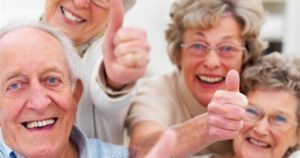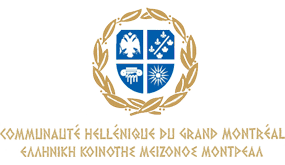AGING WITH DIGNITY, SURVIVING THE AGEISM TRAP
Editorial by Eleni Fakotakis Kolaitis, Director, SSHQ
 AGEISM, is as evil and ugly as sexism and racism. It is a process by which younger generations and institutional structures regularly stereotype and discriminate against seniors who are perceived as needy and not capable. They cease to identify with elders as human beings who can be independent, wise and autonomous.
AGEISM, is as evil and ugly as sexism and racism. It is a process by which younger generations and institutional structures regularly stereotype and discriminate against seniors who are perceived as needy and not capable. They cease to identify with elders as human beings who can be independent, wise and autonomous.
This is unfortunate, when one considers that in the past, in certain cultures, the elderly held their place ‘’at the head of the table’’ and were valued because of their years of experience, their vision and wise words of advice. What happened to completely reverse this trend? We still see discriminatory practices that perpetuate stereotypes on the basis of age, such as the way society and cities are structured, as if everyone was young. Including the fact that the victim of ageism is not as protected by our legal systems as the other evil ‘’isms’’, ageism is tolerated by society.
It is important to note that while not all elderly are affected in the same way by ageism depending on their socioeconomic situation, education and self-esteem; misconceptions about aging and ageism in general have debilitating and other negative consequences which will only serve to marginalize, exclude or disadvantage the elderly from feeling like an individual and that they were once a human being with rights. Society works hard at emphasizing ageism and enabling seniors to feel this way, such as being forced into retirement, discriminated upon in the workplace, spoken to as if they were a child, seen as having lost their beauty, competence, strength and speed, perceived as a burden to family members as well as to society, being blamed for the rising health care costs, being treated with impatience and scolded for being forgetful, not being sufficiently consulted about living arrangements and other family matters, being manipulated into cleaning and taking care of grandchildren regardless of their own schedule, becoming a victim of fraud, not reporting abuse, the examples are endless.
As a result, many elderly people start to doubt themselves and their abilities, to lose their self-esteem and self-confidence because of ageism attitudes around them. They start to internalize negative images of old age, which can lead them to impose limits on their activities and ultimately to isolation. Some relinquish their independence or refrain from participating in society because they themselves now perceive certain behaviors or activities as inappropriate for people their age. They will internalize negative thoughts such as, ‘’Learn computers at MY AGE !?’’, ‘’Go on a date at MY AGE !?’’, ‘’I am useless to my family and to society’’, ‘’ I am physically fragile and cannot do things for myself’’, ‘’I don’t want to be a burden to my family.’’
Going through the aging process while staying as active as possible, is vital to quality living and living with dignity. The elderly must be active participants in their lives and in their community in order to maintain their well being, abilities and social life. We live in a part of the world where our charter of rights protect the individual’s equality and their opportunities regardless of age. Our laws and our attitudes must aim to change how we view aging, to be more positive as opposed to negative. In order to counter ageism, we should favor and live with certain standards and principles as we and our loved ones age, such as:
- Promoting independence, autonomy and active participation in daily life and routine as much as possible
- Recognizing and respecting diversity and individuality
- Appreciating, acknowledging and recognizing contributions and abilities rather than concentrating on limitations
- Feeling part of a community or group
- Encouraging the development of neighborhood senior social centers, volunteerism post retirement
- Assuring a safe and secure home and activity center environment, safe neighborhoods and dealing appropriately with conflict between autonomy and security
- Respecting equal and quality medical treatment and intervention at any age
- Respecting the right to die with dignity
STAY ACTIVE! Let our service, SSHQ, help you to remain socially and mentally active, join one or more of our activities or courses. Whether you want to make new friends, join a support group, help your community offer activities, share your expertise, make friendly calls to elderly living alone, whether you would like to improve your energy and strengthen your body overall, or whether you want to learn how to use a computer or tablet our expert trainers, instructors and intervention counselors will be happy to work with you and to make your experience with us a memorable one.
Points of service:
- Côte-des-Neiges, Outremont (Head Office)
5777 Wilderton Avenue, Montreal, Québec, H3S 2V7
Tel: 514-738-2421 ext. 121 Mary Arvanitaki - Chomedey, 3860, Notre Dame, Suite 202, Laval, Québec H7V 1S1
Tel: 450-688-2091 Chryssa Beletsiotis - Parc-Extension, 821 Ogilvy Avenue, Montreal Québec, H3N 1N9
419 rue Saint Roch, SS-06 (Basement), Montreal Québec, H3N 1K2
Tel: 514-906-0784 Mary Arvanitaki - South Shore, 5220, Grande-Allée, Saint-Hubert, Québec H3Y 1A1
Tel: 450-443-8197 Eleni Papadopoulou




